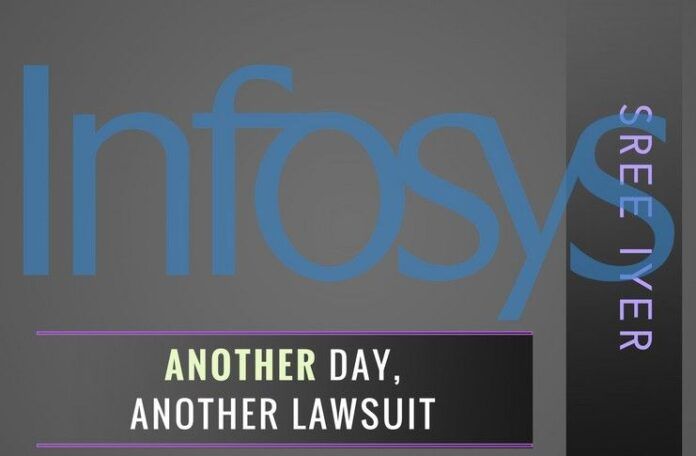
[dropcap color=”#008040″ boxed=”yes” boxed_radius=”8px” class=”” id=””]E[/dropcap]rin Green, the former head of immigration of Infosys in the United States has filed a lawsuit against Infosys (INFY), alleging employee discrimination and retaliation by senior management, and sought damages from the Bengaluru-based company.
It should not only work to impress upon the jury that it is a World Class, Equal Opportunity Employer which respects meritocracy but also that in this case (and who knows how many more are going to come out of the woodworks) and in each of the previous cases, Infosys acted in a fair, professional manner.
What is significant about this case is that Green filed this lawsuit in the Eastern District of Texas, a district court that is famously referred to as being one of the Rocket Docket courts, for the speed with which it handles patent infringement cases. Patent holders (most of whom tend to be American corporations or inventors) tend to win more (88% in this district versus 68% nationwide) in these courts.
Having been an inventor and fought many a battle defending my Intellectual Property, I can safely say that Infosys has its work cut out. It should not only work to impress upon the jury that it is a World Class, Equal Opportunity Employer which respects meritocracy but also that in this case (and who knows how many more are going to come out of the woodworks) and in each of the previous cases, Infosys acted in a fair, professional manner.
Here is a brief list of news items featuring Infosys in a not-so-positive light:
-
In the month of January 2017, the US Labour Department sued software giant Oracle, accusing it of discriminatory hiring practices against White, Hispanic and African-Americans in favour of Asians, particularly “Asian Indians”. While this is not directly related to Infosys, the post goes on to describe the implications for companies such as Infosys, wherein a worker has up to seven years in which he/ she can sue the employer, after being terminated.
-
In 2013, four IT workers filed a class-action discrimination lawsuit in the Federal Court in Wisconsin, also part of the Rocket Docket group of courts. In this complaint, the plaintiffs said that they filed a motion seeking class-action certification from 2009, and say the potential pool of plaintiffs may be as large as 125,000!
-
In October 2013, Infosys agreed to pay $34 million to the Office of United States Attorney for several instances of H-1 Visa abuse, falsification of documents etc. The whistleblower in this case, Jack Palmer, got $8 million. It was his testimony that perhaps nailed INFY’s fate in this case.
Conclusion
Are all these incidents unique to Infosys or is it common for a business of its size? A bit of both. Japanese corporations which put down roots in the US in the eighties also faced similar issues until they addressed them. Infosys needs to be professional about it, conduct sensitivity training for its management team that it parachutes into the US and ensure that things are not only fair but appear to be fair.
Note:
1. Text in Blue points to additional data on the topic.
- Indian Parliament’s Special Session is convened to mark the shifting to new Parliament building - September 3, 2023
- Why did Rajat Sharma of India TV not declare that Adani owns more than 16% shares in his channel? - January 29, 2023
- Prannoy Roy to get Rs.605 crore from Adani as per Stock Exchange filing. Why is Income Tax not acting on Roys’ dues of over Rs.800 crore? - January 4, 2023











” Are all these incidents unique to Infosys or is it common for a business of its size? ” —
This is a common practice among US based IT companies (of Indian origin) in general. In fact Infosys is a big company, but there are several such small IT companies that have blatant malpractices. At one end, they take advantage of demand for workforce in US; at other end, they also take extreme undue advantage of Indian graduates hoping to get a job to secure their position in US. From personal experience I can say that they violate labour laws, minimum wage requirement, they keep employees in unhealthy living conditions because it helps save cost, they put employees in constant pressure so that they dont leave them. They are typical head-hunters. This may not be all true in case of Infosys because its a reputed company.